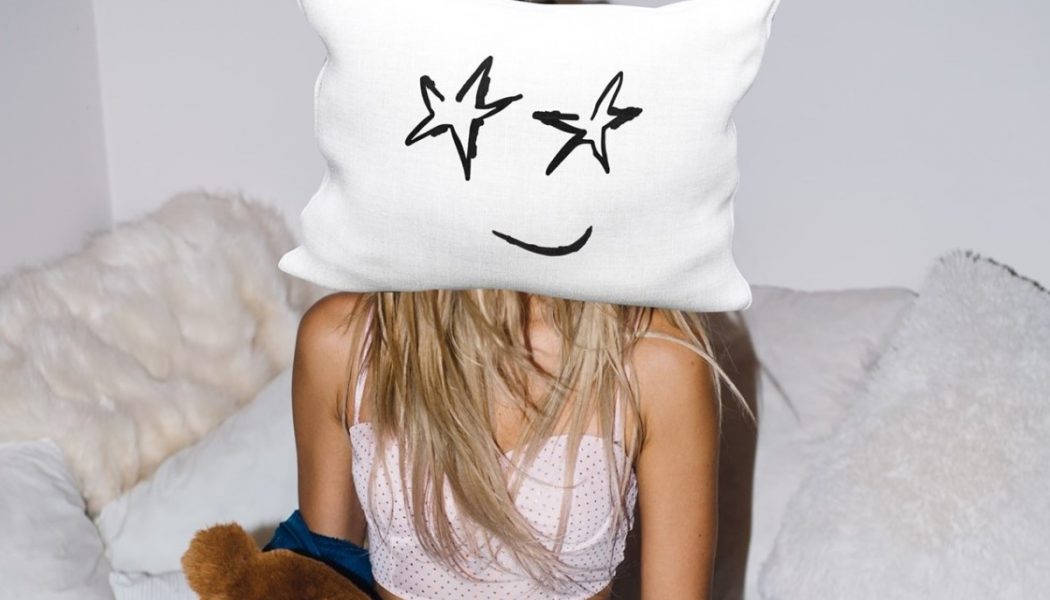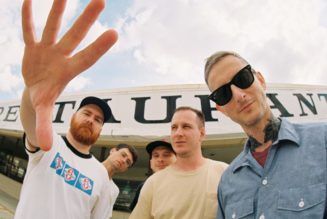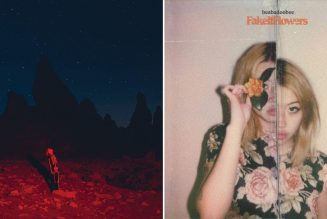Just six years ago, electronic musician Pillows was bouncing from couch to couch with nothing but a dream. Today, she’s penning official covers of globally celebrated tracks like Travis Scott‘s “Goosebumps” and TLC‘s “No Scrubs.”
It’s a glow-up story in the truest sense, with a pathway that was anything but roses.
Born in Hungary, Pillows cut her teeth as a singer and songwriter on electronic instrumentals. But after immigrating the the States in 2014, she decided to take her career into her own hands, exhausted by the complex relationships between topliners and producers. What followed was an intense curriculum of professional training, including a sound engineering and vocal production degree from UCLA and virtual and in-person classes at the now-defunct Dubspot.
Still, Pillows found time to launch her first solo project, Ameria, in 2015. Between residencies at OMNIA San Diego and Marquee Las Vegas and afterparty performances for Rihanna and the Los Angeles Lakers, life was looking up.
Despite this success, Pillows—then Ameria—could sense roadblocks in her path. She often felt judged because of her looks, she told EDM.com, and was undervalued because of her gender.
This acute awareness became a qualitative fact once put to the test. Ameria would send the same track to the same label two different times, first with her name as the byline and then again with a made-up male alias. “They would sign it coming from the guy, but not from me,” she remembered.
And so in 2019, Pillows was born, a pivot ultimately precipitated by industry discrimination and archaic standards for women. At the same time, the project points to the artist’s uncanny ability to persevere—beyond the immigrant experience, beyond financial hardship and beyond gender bias. Pillows has moved into a new creative space that transcends identity and genres. Moreover, her formidable résumé of technical training and performing provides the clout necessary for Pillows to receive release clearance for her array of covers.
“I always thought that my life had these weird, interesting events because I have this go-getter, nothing matters personality. I just manifest for really dope shit to happen,” Pillows explained. “I think, ‘How do I want my story to go?'”
Pillows released her latest song today, March 26th, a cover of “I Can’t Go For That” by Hall & Oates. Co-written with James Mercy, the new take puts Pillows’ vocals front and center, backed by a breezy deep house beat.
Ahead of the track’s release, Pillows chatted with EDM.com about her transition from Ameria to the artist she is now, and the sense of empowerment she finds in music production and performance.
EDM.com: Tell me a little bit about how you first transitioned from singing and songwriting into producing music.
Pillows: I worked as a songwriter in Hungary, but the most frustrating thing for me was that when I went to the studio and recorded something, I had to keep following up with the producer, like, “Hey, when will it be ready?” And one day I was like, “Damn. I’m just sitting here waiting. How dope would it be if I could just do the work, and it’ll be up to me when the record will go out?”
There was also always this battle with producers. If you write the song and you sing, you did the topline, to me that always felt like carrying a lot of the song’s success. If I write a shitty topline, it doesn’t matter if the track has a fire instrumental. The two have to work together.
And I felt like it was always so weird that producers would either remove your name or it would just be a feature. I remember I had these crazy battles. It feels like they don’t recognize how much you’re adding to the project. And at that point, I was like, “Alright, I’m just going to be my own artist.”
It seems like your career moved pretty quickly from there, as the Ameria project was officially launched in 2015.
Pillows: I would say so! I think the most important part was that every time I hit a wall and things weren’t going the way I wanted or happening as quickly as I would’ve liked, I thought about how most people would have stopped. They’d give up thinking it was too hard and wasn’t worth it.
And seeing it like that, I could think to myself, “Am I most people? Or am I going to be that 1% that keeps going?” That was the theory I kept in my head to I could push myself.
Considering the amount of success you were having, what made you decide to transition into your current Pillows moniker?
Pillows: With Ameria, I always thought the record labels and industry people judged me. Everybody just always saw me as just another chick who acts like she produces but really doesn’t. “She’s selling sex and tries to sell her music as sex.” I always thought that that was a shitty way to look at me, and I thought people weren’t taking me seriously.
Then, somebody told me that they thought it was my branding: “The music is good. It’s just your appearance. There’s nothing about you that looks like an artist.” And so then I was like, “You know what? Then let me change. Let me desexualize it and wear literally a onesie.”
What was it like to have to change your identity in order to fit the industry’s standards?
Pillows: It was super frustrating. When I was still working as Ameria, I’d send a song to a label but also have a friend of mine come up with a fake dude’s name and send the same song. They would sign it coming from the guy but not from me. And there were so many times I went to a studio and they were like, “Oh, you produce?” They’d act like it was crazy, like there was no way I could touch anything with the instrumentals.
And they’d test me on it. They used to ask me questions thinking I wasn’t going to know. I feel that just because girls don’t usually do this work, there’s a stigma thinking we can’t. It was the most frustrating thing ever, but I also feel like it was more of a thing four or five years ago. Things are definitely shifting now.
Now, I kind of wish I wouldn’t have cared so much, and I wish I’d given a little bit less of a fuck about it. I remember I was so critical of Ameria. But I feel like with Pillows overall, I just take it more lightly. I feel like no one’s asking me if Pillows is producing or not. It’s just, “Is the music dope or not?” I think it definitely has to do with not knowing who Pillows is, because you can’t judge it. I think my attitude toward it is also that it’s me, but at the same time, it’s not. It’s almost like a product.
Why did you decide to build this new brand around a pillow?
Pillows: I used to shout into my pillows when I was overwhelmed. I used to just mush my head into the pillows and just relax in there. And then I was thinking, “Maybe I’m going to come up with a new brand and call it Pillows, and it’s going to be like a pillow fight.”
And the more I thought about it, I wondered what it would be like to go to the club and not have it be about how you look that night. Personally, I went to a lot of places where I could’ve had an amazing time, but just to look good I wasn’t comfortable. I couldn’t move around in those clothes. I was like, “What if it wasn’t important how you looked? What if it was all about the show, and you could literally come wearing a onesie?” It’s about the music, not about the social stigma.
Looking at the last year, you’ve been releasing a lot of cover tracks. How would you describe the twist you’re putting on these iconic originals?
Pillows: I want them all to be a more danceable version, something that’s a good 120 BPM. I think every song I keep around a 120 and 128. And that’s the most important thing to me now, is I just want my music to be danceable throughout the entire track. I also always want to make sure it’s recognizable, that I’m not making such a new version that people won’t be able to recognize it.
What’s so important to you about making people dance?
Pillows: I think it’s very empowering. Especially being a DJ, doing a good job is much more impressive to people when you’re a girl. From a guy, it’s like, “Duh, you know how to DJ.” But for a girl, they are like, “Wow, I didn’t expect her to drop such a dope set.”
So when I can see people in the crowd and they’re having a fucking amazing time, you enhance their life. It’s just such an amazing thing. That keeps me going.
How do you think you’ve changed throughout the experience of entering EDM and growing into Pillows?
Pillows: I always was so desperately wanting a career and wanting things to move really fast, and I feel like that was something that slowed me down. I feel like when you’re chasing something, it’s running from you. Now, I’m like, “I’m going to be just fine. If it happens, great. If not, great.”
I think when you’re just a little bit more calm about it and you just let things happen, I feel like that’s when certain things are going to come. That’s a little bit of what happened with Pillows. I’m obviously putting a lot of energy and effort into it, but I have a very different mentality than with Ameria. I’m more confident, and really great things are just happening.
FOLLOW PILLOWS:
Facebook: facebook.com/iampillows
Instagram: instagram.com/iampillows
Spotify: spoti.fi/31gcMk0












![“Future Rave” Pioneers David Guetta and MORTEN Claim Their Territory With “New Rave” EP [Exclusive Interview]](https://www.wazupnaija.com/wp-content/uploads/2020/07/future-rave-pioneers-david-guetta-and-morten-claim-their-territory-with-new-rave-ep-exclusive-interview-327x219.png)
